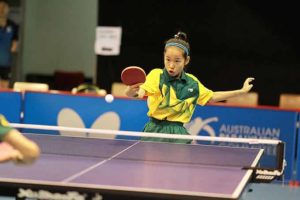Back to: Primary Health Education Primary 5
Welcome to today’s class!!
We are thrilled to have you in our class!!
In today’s Physical Education Class class, we will be learning about Table Tennis Games
Table Tennis Games

Names like Serena Williams, Venus Williams, Naomi Osaka, and recently Coco Gauff are names that remind us how hardworking these women are and the Sports game they have participated in over the years. Even if you do not like the game, you like the player. And over the years, Table Tennis has caught a lot of attention.
Table tennis (also known as ping-pong) is a racket sport derived from tennis but distinguished by its playing surface being atop a stationary table, rather than the court on which players stand. Either individually or in teams of two, players take alternating turns returning a light, hollow ball over the table’s net onto the opposing half of the court using small rackets until they fail to do so, which results in a point for the opponent. Play is fast, requiring quick reaction and constant attention, and is characterized by an emphasis on spin relative to other ball sports, which can heavily affect the ball’s trajectory.
The sport originated in Victorian England, where it was played among the upper-class as an after-dinner parlor game. It has been suggested that makeshift versions of the game were developed by British military officers in India around the 1860s or 1870s, who brought it back with them. A row of books stood up along the center of the table as a net, two more books served as rackets and were used to continuously hit a golf-ball.
Table tennis strokes generally break down into offensive and defensive categories.
Let’s consider some of the terms uses in Table Tennis Games
- Hit
Also known as speed drive, a direct hit on the ball propelling it forward back to the opponent. This stroke differs from speed drives in other racket sports like tennis because the racket is primarily perpendicular to the direction of the stroke and most of the energy applied to the ball results in speed rather than spin, creating a shot that does not arc much, but is fast enough that it can be difficult to return. A speed drive is used mostly for keeping the ball in play, applying pressure on the opponent, and potentially opening up an opportunity for a more powerful attack.
- Loop
Perfected during the 1960s, the loop is essentially the reverse of the chop. The racket is parallel to the direction of the stroke (“closed”) and the racket thus grazes the ball, resulting in a large amount of topspin.
- Counter-hit
The counter-hit is usually a counterattack against drives, normally high loop drives. The racket is held closed and near to the ball, which is hit with a short movement “off the bounce” (immediately after hitting the table) so that the ball travels faster to the other side.
- Smash
A player will typically execute a smash when the opponent has returned a ball that bounces too high or too close to the net. It is nearly always done with a forehand stroke. Smashing uses rapid acceleration to impart as much speed on the ball as possible so that the opponent cannot react in time. The racket is generally perpendicular to the direction of the stroke.
In summary, because speed is the main aim of a smash shot, the spin on the ball is often minimal, although it can be applied as well. An offensive table tennis player will think of a rally as a build-up to a winning smash. Smash is used more often with penhold grip.
Evaluation
What is the Table Tennis Game?
Reading Assignment
What is another name the Table Tennis game is identified as?
Weekend Assignment
Explain the following:
- Hit
- Counter-hit
- Smash
We hope you enjoyed today’s class. In our next class, we will be talking about
Let us know your thoughts and questions in the comment section, and we will attend to them as fast as we can.
